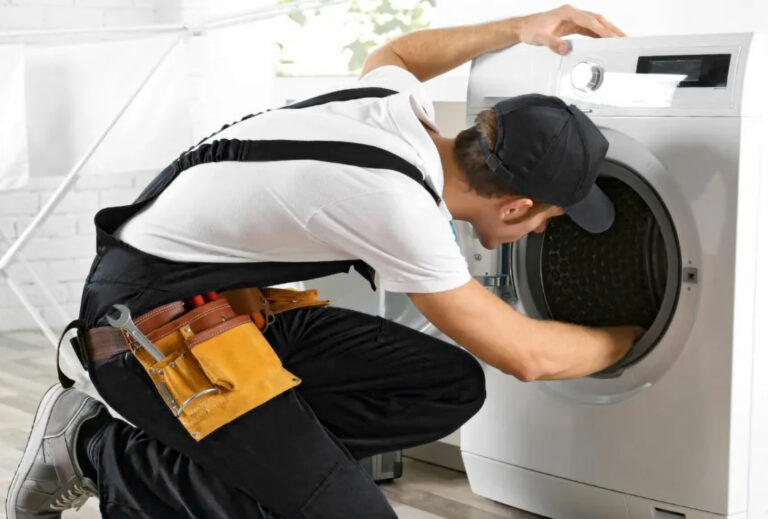How to Fix a Leaking Washing Machine: A Step-by-Step Guide
A leaking washing machine or dishwasher can quickly turn into a household nightmare. Not only does it disrupt your daily routine, but it can also damage your floors and significantly increase your water bill. Fortunately, with a bit of know-how, you can often fix these appliances yourself before needing to call a professional.
Why Is My Washing Machine Leaking?
Before attempting any repairs, always unplug your appliance to avoid any electrical hazards. Then, perform these simple checks:
- Door Not Closed Properly
Make sure the washing machine door is fully closed. A poorly locked door can lead to significant leaks during the wash cycle.
- Drum Imbalance
An overloaded drum can cause imbalance and water overflow. Distribute your laundry evenly inside the drum.
- Prolonged Rinse Cycle
Manually extending the rinse cycle might result in excess water overflowing from the drum. Stick to the recommended settings to avoid this issue.

How to Fix a Leaking Washing Machine: 5 Easy Steps
- Check the Water Supply Hoses
The inlet hoses at the back of your washing machine may become worn, cracked, or improperly connected.
- Inspect for Leaks: If you see water leaks, replace the faulty hoses immediately.
- Tighten Connections: Make sure all connections are securely tightened.
- Inspect the Drain Pump
The drain pump is responsible for expelling water after the wash cycle.
- Look for Damage: If the pump is rusty or leaking, it might need replacement.
- DIY Replacement: You can replace the pump yourself by removing a few components of the appliance.
- Examine Seals and Gaskets
Over time, rubber seals can deteriorate, leading to water leaks.
- Replace Worn Seals: This quick fix can often solve the problem immediately.
- Check the Drain Plug
When installing a new washing machine, sometimes the drain plug is not removed, preventing proper drainage and causing leaks.
- Remove the Plug: If necessary, ensure the drain plug is fully removed.
- Unclog the Drain Hose
A clogged drain hose can also cause water leaks.
- Clear the Clog: Use a plumbing snake or a garden hose to clear any obstructions.
Why Is My Dishwasher Leaking? Common Causes and Solutions
A leaking dishwasher can be just as problematic as a faulty washing machine. Here are the main possible causes and how to fix them:
- Leaks Around the Door
The spray arms inside the dishwasher use high pressure to clean dishes. If the nozzles are clogged or damaged, water can spray directly onto the door seals, causing leaks.
Solution:
- Check the Spray Arms: Replace them if they are damaged.
- Examine Door Seals: If the seals are warped or worn out, replace them immediately.
- Drainage Problems
The dishwasher reuses water during its cycle using a drain pump. A faulty pump or a damaged drain hose can cause leaks during the drainage process.
Solution:
- Inspect the Drain Pump: Look for signs of wear or rust.
- Check the Drain Hose: Make sure it is not cracked or clogged.
- Continuous Leaks Even When Not in Use
If your dishwasher leaks continuously, even when it is turned off, this might indicate a plumbing issue rather than an appliance problem.
Solution:
- Inspect Your Water Supply: Check filling hoses and fitting seals.
- Call a Professional: If you cannot identify the source of the leak, a professional inspection is recommended.
When to Call a Professional Plumber?
If your washing machine or dishwasher continues to leak despite your repair attempts, it might be time to contact a professional.
Plombier Paris Offers:
- Accurate Leak Diagnosis: We identify the exact source of leaks.
- Reliable and Long-Lasting Repairs: Our solutions ensure optimal performance of your appliances.
- Regular Maintenance Services: Prevent future leaks and extend the lifespan of your appliances.
Contact Plombier Paris for Fast and Effective Appliance Repair!
Don’t wait for leaks to worsen and cause more significant damage. Contact our plumbing experts in Paris today for quick and efficient service!
